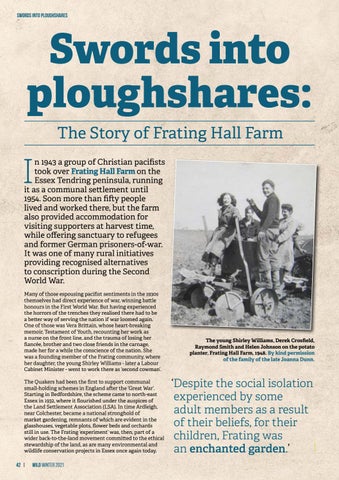Swords into ploughshares
Swords into ploughshares: The Story of Frating Hall Farm
I
n 1943 a group of Christian pacifists took over Frating Hall Farm on the Essex Tendring peninsula, running it as a communal settlement until 1954. Soon more than fifty people lived and worked there, but the farm also provided accommodation for visiting supporters at harvest time, while offering sanctuary to refugees and former German prisoners-of-war. It was one of many rural initiatives providing recognised alternatives to conscription during the Second World War.
Many of those espousing pacifist sentiments in the 1930s themselves had direct experience of war, winning battle honours in the First World War. But having experienced the horrors of the trenches they realised there had to be a better way of serving the nation if war loomed again. One of those was Vera Brittain, whose heart-breaking memoir, Testament of Youth, recounting her work as a nurse on the front line, and the trauma of losing her fiancée, brother and two close friends in the carnage, made her for a while the conscience of the nation. She was a founding member of the Frating community, where her daughter, the young Shirley Williams - later a Labour Cabinet Minister - went to work there as ‘second cowman’. The Quakers had been the first to support communal small-holding schemes in England after the ‘Great War’. Starting in Bedfordshire, the scheme came to north-east Essex in 1932, where it flourished under the auspices of the Land Settlement Association (LSA). In time Ardleigh, near Colchester, became a national stronghold of market gardening, remnants of which are evident in the glasshouses, vegetable plots, flower beds and orchards still in use. The Frating ‘experiment’ was, then, part of a wider back-to-the-land movement committed to the ethical stewardship of the land, as are many environmental and wildlife conservation projects in Essex once again today.
42 |
WILD WINTER 2021
The young Shirley Williams, Derek Crosfield, Raymond Smith and Helen Johnson on the potato planter, Frating Hall Farm, 1948. By kind permission of the family of the late Joanna Dunn.
‘Despite the social isolation experienced by some adult members as a result of their beliefs, for their children, Frating was an enchanted garden.’






